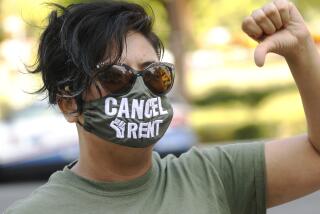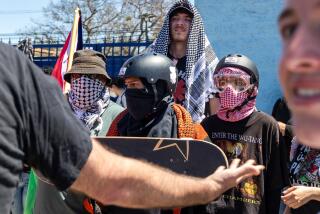Prosecutors Wary of ’87 State Hate-Crimes Law : Crime: The Banes Act allows some cases to be handled as felonies rather than misdemeanors if they were at least partially motivated by hate.
Faced with a rising tide of hate crimes, California passed a law in 1987 aimed at making it easier to prosecute offenders. But some legal experts say the law, though a good beginning, is too vague and hasn’t won widespread acceptance from prosecutors.
Modeled after federal hate-crimes laws, the Banes Civil Rights Act broadened previous state civil rights laws. It prohibits all violence, threats or intimidation based on race, color, ancestry, religion, national origin, disability, sex or sexual orientation.
Most important, the Banes Act allows prosecutors to press felony charges in cases that would otherwise be misdemeanors if they can show that the crimes were at least partly motivated by hate.
For example, someone who spray-painted a swastika on the sidewalk outside a Jewish family’s home, as happened earlier this year in Costa Mesa, would likely have been charged with a misdemeanor graffiti offense under previous law. Under the Banes Act, the offender could be charged with a felony and imprisoned if prosecutors could show, beyond a reasonable doubt, that the suspect intended to intimidate, threaten or harass the family because of its religion.
In practice, however, prosecutors may find it tricky to prove in court that a crime was motivated by hate, legal experts believe.
“It’s difficult to get the evidence, because you have to show that it was motivated by bigotry,” said Deputy Atty. Gen. Manuel Medeiros of the Civil Rights Enforcement Unit in Sacramento. “Do you have spoken words? It is often one person’s word against another’s. Were there witnesses?”
The mere fact that a crime suspect and his victim belong to different races, for example, does not automatically constitute a hate crime--even if, as in the Amber Jefferson case, racial epithets were used during the incident, Supervising Deputy Atty. Gen. Marian Johnston said Tuesday.
“It’s a question of fact,” Johnston said. “The use of racial epithets could be one source of evidence, but it may not be determinate, depending on what else went on.”
A key factor might be whether the victim was singled out or chosen because of his or her identity, Johnston said. In an assault on a homosexual, for example, prosecutors would need evidence that the attackers either knew or believed the victim to be gay.
Because of such ambiguities, the decision about whether to file hate crime charges--or any other criminal charges--is inevitably influenced by politics, said Fred Persily, director of the Hate Violence Mediation Task Force for Contra Costa County and author of a new report on hate crime in California.
“It’s up to the D.A. to decide, but often they are political decisions rather than factual decisions,” Persily contended. He said the guidelines for what constitutes a hate crime are open to interpretation, and there are as yet few court decisions to clarify the standards.
Moreover, after two years, many district attorneys and police departments are either unaware of or uncomfortable with the new law, Persily said.
Some district attorneys avoid the hate statute because they are concerned that failure to prove a racial motivation might jeopardize the rest of the case. On the other hand, using the hate charge can allow prosectors to introduce evidence that strengthens their case, Persily said.
“You can, for example, bring some guy’s Ku Klux Klan affiliation before a jury, where before you couldn’t present that evidence to the jury at all,” Persily said.
“I won’t pretend to say the statute is adequate,” Medeiros said. “But I think it’s a real good start.”
Statewide, the hate-crimes law has been used only a dozen or so times since it went into effect on Jan. 1, 1988, Medeiros said. But it has been used by prosecutors in Orange County at least twice.
Three young neo-Nazi “skinheads” were each sentenced to more than four years in prison for beating a gay man with a lead pipe in Laguna Beach in 1988. Though acquitted of attempted murder, the defendants were convicted of assault and hate crimes, Orange County Deputy Dist. Atty. Tom Avdeef said.
“There’s a lot more you have to prove, specifically that the individual was attacked for the specific reason that he was black or Mexican or whatever,” Avdeef added. “In the case of a gay individual, you have to have the (victim) admit that he was gay.”
The Laguna Beach case, Avdeef said, was “a vicious attack by skinheads on gays, and that’s what I wanted to bring out in the motive. You wouldn’t be bringing in evidence of what the mentality or makeup of a skinhead gang is if you it were just dealing with the specific (assault) charges.”
In Fullerton, police used the statute to charge a paroled robber and known Ku Klux Klan associate who threatened and harassed a Jewish restaurant employee in February. Martin Dayton Cox’s parole was revoked, sending him back to state prison for a year, and when he is released he will face trial again on the hate charge, Fullerton Police Capt. Lee Devore said.
Gary A. Stillman of Westminster was sentenced to 37 months in prison last year for burning a cross at the home of a neighboring black family. That case, however, was prosecuted by the U.S. attorney under a federal law against conspiring to violate civil rights.
In addition to the laws banning hate crimes, both California and the federal government have in the past year enacted laws designed to facilitate the reporting of hate crimes. However, neither the state nor the federal government has set aside money for such monitoring, experts said, and as a result, data about hate crimes in many jurisdictions, including Orange County, remain sketchy or incomplete.
Meanwhile, many victims of hate crimes do not report the incidents, often for fear of further inflaming their persecutors, authorities said.
Within six months of the Westminster cross-burning, for example, another cross was burned at the home of a Filipino family, but the family insisted that they did not want the incident made public, according to Rusty Kennedy, executive director of the Orange County Human Relations Commission.
“They were afraid of becoming the center of attention--fearful that they might have more incidents if they did,” Kennedy said.
MAIN STORY: A1
More to Read
Sign up for Essential California
The most important California stories and recommendations in your inbox every morning.
You may occasionally receive promotional content from the Los Angeles Times.










